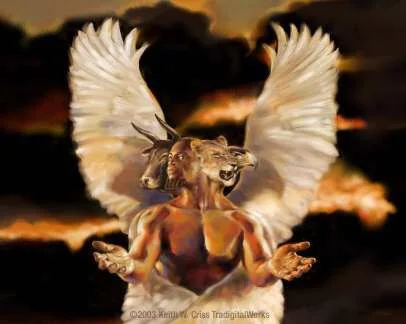Readings for the day: Ezekiel 1-4
Welcome to Ezekiel and some of the strangest writings of the Old Testament! The next several weeks will be confusing if it’s your first time through so let me give you a few tools to help you navigate this book. Let’s begin with some history on Ezekiel himself. Ezekiel was born into a priestly family, most likely during the reign of King Josiah in Judah. You will remember King Josiah was one of the faithful kings of Judah and dedicated his reign to cleansing the land of idols and restoring the true worship of Yahweh. He was married but his wife died just prior to the siege of Jerusalem in 587 BC. He was taken into exile along with many of the leaders and influential people of Judah and resettled in Babylon. There it appears he held an important leadership position among the exiles even before receiving his call to be a prophet.
What sets apart the leadership of Ezekiel are the strange visions he received from the Lord. Like Daniel and the Apostle John, he is given the gift of being able to see beyond the veil of this world into the next. But what he sees is overwhelming. Confusing. It doesn’t make a lot of sense to us 21st century readers. This is a style of writing known as “apocalyptic.” Not unique to the Bible, it has parallels in a lot of ancient near east literature. It has several features you will need to keep in mind as you read.
- Revelation - The very word, “apokalypsis” in the Greek means “revelation” or “disclosure.” Apocalyptic literature is marked by a direct revelation from God to a seer or prophet, usually in visions or dreams, who then writes down what he sees.
- Mystery - The meaning of the visions are often shrouded in mystery. They might refer to past, current, or future events. They may include strange images from the world beyond. While the seer or prophet may write them down in great detail, decifering them is a significant challenge.
- Symbolism - The visions are rife with symbols drawn from nature, ancient near east mythology, astral phenomena, etc. These symbols are used by the seer or prophet to make sense of what he sees and could represent coded language in order to pass imperial censors who may be screening their correspondence.
- Resistance Literature - Because the prophet is typically writing from an “exilic” perspective where he and his people live under oppression, his focus is on the future rather than the present. The visions are meant to provide hope to a people who are suffering.
- God is sovereign - The overarching message of the apocalyptic genre in the Bible is that God reigns. He is supreme. He will judge the nations. He will have the final victory. Despite their present conditions, God’s people are to place their trust in Him.
Ezekiel sees a vision. God appears to him in all His glory and splendor. Living creatures with strange faces. Wheels heading in every direction. High winds. Burning coals of fire. And above it all a throne where a majestic figure sits. It’s so overwhelming that Ezekiel sits speechless for seven straight days.
What is the content of the revelation Ezekiel receives? His calling to be a prophet. Ezekiel is called to be a “watchman” for Israel. He will speak God’s Word to His people. He will embody God’s messages through his actions. He will become the vessel through which God will make known His will. This will not be an easy call. Serving God as His prophet never is! There is always a cost! The people will resist him. The people will reject his message. The people may even beat and attack him. But Ezekiel’s job is simply to be faithful. To sound the trumpet. To give fair warning. To confront God’s people on their sin.
And what will the confrontation look like? This strange scene where Ezekiel lays on his side for 390 days and 40 days respectively to atone for the sins of each kingdom. The 390 days represents the 390 years between the apostasy of Jeroboam of the northern kingdom of Israel when he set up idols for his people to worship and the Babylonian Captivity that Ezekiel is now experiencing. (975-c. 583 BC) The forty days represents the final years of apostasy in the southern kingdom of Judah. Taken together, the 430 years represented matches the number of years Israel was enslaved in Egypt before the Exodus, meaning the key to their future hope lies in the faithfulness God has shown them in the past. God will repeat what He has done and deliver them again from slavery but only after they have returned to Him with all their hearts.
What does any of this have to do with us? Wise and discerning Christians will see the similarities between the apostasy/exile of Israel and the reality of our own apostasy/exile in the church. We too have a need for God to raise up faithful “watchmen and women” who will proclaim the Word of God with boldness. Prophets who will speak God’s truth regardless of how it is received. Men and women who understand their first call is to please Christ rather than people. This is just as hard for us today as it was for Ezekiel back then. And it is the job of every Christian. The call of every single person who claims to follow Jesus. We are the ones whom God has sent! We are the vessels He has chosen to use for His purposes!
